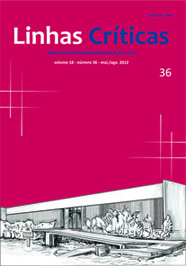“Becoming the master of yourself”: on the current ethical-educational relevance of a classical challenge
DOI:
https://doi.org/10.26512/lc.v18i36.3920Keywords:
Mastering oneself, Character, Decentralization, Will, Self-regulationAbstract
This paper is aimed at revisiting Aristotle, Kant and Piaget, in order to identify in such authors contributions to bring to the floor a problematic which is crucial to the sphere of moral education, namely, “becoming the master of yourself”. Despite the temporal distance and theoretical differences among those three authors, we consider that their approaches converge to defend the need to develop in individuals the ability to master themselves. Such mastering allows the subject to contest the immediacy of his wishes and is a condition to reach a satisfactory level of coherence between moral judgment and action. Ultimately, when related to the field of moral education, this problematic points to the need to educate subjects, so as to create the conditions for them to regulate themselves morally.
Downloads
References
AGOSTINHO. Confissões. São Paulo: Abril, 1973.
___ . O livre arbítrio. São Paulo: Paulus, 1995.
ARENDT, H. A vida do espírito: o pensar, o querer, o julgar. 2 ed. Rio de Janeiro: Relume Dumará, 1993.
ARISTÓTELES. Ethique a Nicomaque. Paris: Vrin, 1959 (Trad. J. Tricot).
___ . Ética Eudemiana In: Ética Nicomáquea/ Ética Eudemiana. 3ed. Madrid: Gredos, 1995.
AUBENQUE, P. La prudence chez Aristote. 2ed. Paris: PUF, 1997.
CHAUÃ, M. Simulacro e poder: uma análise da mídia. São Paulo: Editora Fundação Perseu Abramo, 2006.
FARIAS, M. C. B. A liberdade esquecida. São Paulo: Loyola, 1995.
GADAMER, H.-G. Verdad y método (v.I). Salamanca: Sígueme, 1984.
KANT, I. Úber Pädagogik. In: Scriften zur Anthropologie, Geschichtsphilosophie, Politik und Pädagogik. Werke Bd.9/10. Darmstadt: Wissenschaftliche Buchgesellschaft, 1983a.
____ . Kritik der Urteilskraft. Werke Bd. 8. Darmstadt: Wissenschaftliche Buchgesellschaft, 1983b.
____ . Grundlegung zur Metaphysik der SitteN. In: Scriften zur Ethik und Religionsphilosophie. Werke Bd. 6. Darmstadt: Wissenschaftliche Buchgesellschaft, 1983c.
____ . Lecciones de ética. Barcelona: Crítica, 1988.
____ . La metafísica de las costumbres. 2 ed. Madrid: Tecnos, 1994.
____ . Sobre a pedagogia. 2 ed. Piracicaba: Unimep, 1999.
KLEIN, Z. La notion de dignité humaine dans la pensée de Kant et de Pascal. Paris: Vrin: 1968.
LA TAILLE, Y. A educação moral: Kant e Piaget. In: MACEDO, L. (Org.). Cinco estudos de educação moral. São Paulo: Casa do psicólogo, 1996.
MUÑOZ, A. A. Liberdade e causalidade: ação, responsabilidade e metafísica em Aristóteles. São Paulo: Discurso, 2002.
MUNZEL, F. Kant’s conception of moral character: the critical link of morality, antropology and reflective judgment. Chicago: The University of Chicago Press, 1999.
OVIDEO. Metamorfoses. Lisboa: Cotovia, 2007.
PATZIG, G. Principium diiudicationes und principium executionis: Über transzendentalpragmatische Begründungsansätze für Verhaltensnormen. In: Gesammelte Schriften I. Göttingen: Wallstein, 1994, p.255-274.
PHILONENKO, A. Introduction. In: KANT, Emmanuel. Réflexions sur l ´éducation. 8 ed. Paris: Vrin, 2000.
PLATÃO. Protagoras, o los sofistas. In: Obras completas. 2ed. Madrid: Aguilar, 1993.
PIAGET, J. Les relations entre laffectivité et lintelligence dans le développment mental de l`enfant. Paris: Centre de Documentation Universitaire, 1954. Disponível em: http://www.fondationjeanpiaget.ch/fjp/site/textes/VE/JP_54_cours_affect.pdf. Acesso em: 10.09.2009.
PUIG, J. M. A construção da personalidade moral. São Paulo: Ática, 1998.
Downloads
Published
How to Cite
Issue
Section
License
Copyright (c) 2016 Linhas Críticas

This work is licensed under a Creative Commons Attribution 4.0 International License.
Authors who publish in this journal agree to the following terms:
-Authors maintains the copyright and grants the journal the right of first publication, the work being simultaneously licensed under the Creative Commons Attribution License which allows the sharing of the work with recognition of the authorship of the work and initial publication in this journal.
- Authors are authorized to enter into additional contracts separately, for non-exclusive distribution of the version of the work published in this journal (eg publish in institutional repository or as a book chapter), with acknowledgment of authorship and initial publication in this journal.
-Authorers are allowed and encouraged to publish and distribute their work online (eg in institutional repositories or on their personal page) at any point before or during the editorial process, as this can generate productive changes as well as increase the impact and the citation of published work (See The Effect of Free Access).



